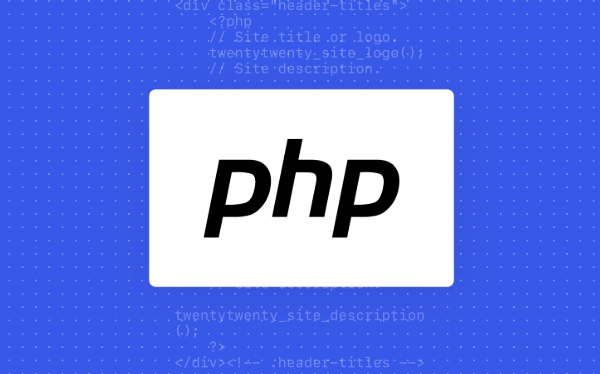 Backend Development
Backend Development
 PHP Tutorial
PHP Tutorial
 Conditional Logic in an OOP Context: Polymorphism as an if Alternative
Conditional Logic in an OOP Context: Polymorphism as an if Alternative
Conditional Logic in an OOP Context: Polymorphism as an if Alternative
Jul 31, 2025 am 08:30 AMPolymorphism can replace conditional logic in OOP to improve code maintainability and extensibility; 2. Replace type checks with inheritance and method overriding to eliminate if-else chains, as shown by moving fly() behavior into subclasses like Eagle, Penguin, and Sparrow; 3. Use the Strategy Pattern to encapsulate varying algorithms, such as shipping methods, into separate classes implementing a common interface; 4. Inject strategies into objects so behavior can be changed at runtime without modifying existing code; 5. Retain conditionals only when logic is simple, based on runtime data, or at system boundaries, but use them to instantiate polymorphic objects; 6. Benefits include easier extension, better readability, improved testability, and clearer domain modeling; 7. Polymorphism relocates conditionals to object creation, enabling cleaner, more scalable designs where new behaviors are added through new classes rather than modified logic.

When you're working in an object-oriented programming (OOP) context, conditional logic—especially chains of if, else if, and switch statements—can quickly become unwieldy. While conditionals are perfectly valid, they often signal an opportunity to leverage polymorphism instead. Polymorphism allows you to replace explicit conditionals with dynamic method dispatch, leading to cleaner, more maintainable, and extensible code.

Here’s how polymorphism can serve as a powerful alternative to conditional logic.
Replace Type Checks with Polymorphic Behavior
A common anti-pattern is checking an object’s type (or a property like type, kind, or status) and branching logic accordingly:

class Bird:
def __init__(self, bird_type):
self.bird_type = bird_type
def fly(self):
if self.bird_type == "eagle":
print("Soaring high!")
elif self.bird_type == "penguin":
print("Can't fly!")
elif self.bird_type == "sparrow":
print("Flapping quickly!")This approach is fragile—adding a new bird requires modifying the fly() method, violating the Open/Closed Principle.
Instead, use inheritance and method overriding:

class Bird:
def fly(self):
raise NotImplementedError
class Eagle(Bird):
def fly(self):
print("Soaring high!")
class Penguin(Bird):
def fly(self):
print("Can't fly!")
class Sparrow(Bird):
def fly(self):
print("Flapping quickly!")Now, calling bird.fly() automatically executes the correct behavior—no conditionals needed.
Strategy Pattern: Encapsulate Conditional Logic
Sometimes, behavior varies based on strategy or algorithm choice. Instead of:
def calculate_shipping(order, method):
if method == "standard":
return order.value * 1.0
elif method == "express":
return order.value * 1.5
elif method == "overnight":
return order.value * 2.5You can define a ShippingStrategy interface:
from abc import ABC, abstractmethod
class ShippingStrategy(ABC):
@abstractmethod
def calculate(self, order_value):
pass
class StandardShipping(ShippingStrategy):
def calculate(self, order_value):
return order_value * 1.0
class ExpressShipping(ShippingStrategy):
def calculate(self, order_value):
return order_value * 1.5
class OvernightShipping(ShippingStrategy):
def calculate(self, order_value):
return order_value * 2.5Then inject the strategy:
class Order:
def __init__(self, value, shipping_strategy: ShippingStrategy):
self.value = value
self.shipping_strategy = shipping_strategy
def total_cost(self):
return self.value self.shipping_strategy.calculate(self.value)Now, adding a new shipping method doesn’t require changing any existing logic—just implement a new class.
When to Keep Conditionals
Polymorphism isn’t always the answer. Consider keeping conditionals when:
- The logic is simple and unlikely to change.
- The conditions are based on runtime data (e.g., user input validation).
- You're at the boundary of the system (e.g., parsing input to choose an object).
But even then, you can use conditionals once to instantiate the right object, then delegate to polymorphic methods:
def create_bird(bird_type):
if bird_type == "eagle":
return Eagle()
elif bird_type == "penguin":
return Penguin()
else:
raise ValueError("Unknown bird type")After this, the rest of your code works with Bird objects polymorphically.
Benefits of Polymorphism Over Conditionals
- Extensibility: Add new behaviors by adding classes, not editing existing ones.
- Readability: Each class has a single responsibility.
- Testability: You can test each implementation in isolation.
-
Design Clarity: Reveals domain concepts more clearly than nested
ifstatements.
Polymorphism doesn’t eliminate conditional logic entirely—it just moves it to the right place. By using objects and methods to encapsulate behavior, you make your code more modular and easier to evolve. So next time you reach for an if statement based on type or mode, ask: Could this be a method on an object instead?
Most of the time, the answer is yes.
The above is the detailed content of Conditional Logic in an OOP Context: Polymorphism as an if Alternative. For more information, please follow other related articles on the PHP Chinese website!

Hot AI Tools

Undress AI Tool
Undress images for free

Undresser.AI Undress
AI-powered app for creating realistic nude photos

AI Clothes Remover
Online AI tool for removing clothes from photos.

Clothoff.io
AI clothes remover

Video Face Swap
Swap faces in any video effortlessly with our completely free AI face swap tool!

Hot Article

Hot Tools

Notepad++7.3.1
Easy-to-use and free code editor

SublimeText3 Chinese version
Chinese version, very easy to use

Zend Studio 13.0.1
Powerful PHP integrated development environment

Dreamweaver CS6
Visual web development tools

SublimeText3 Mac version
God-level code editing software (SublimeText3)
 Harnessing Short-Circuit Evaluation in PHP's Logical Operators
Jul 29, 2025 am 05:00 AM
Harnessing Short-Circuit Evaluation in PHP's Logical Operators
Jul 29, 2025 am 05:00 AM
Short circuit evaluation is an important feature of logic operators in PHP, which can improve performance and avoid errors. 1. When using &&, if the left operand is false, the right operand will no longer be evaluated; 2. When using ||, if the left operand is true, the right operand will be skipped; 3. It can be used to safely call object methods, such as if($user&&$user->hasPermission('edit')) to avoid empty object calls; 4. It can optimize performance, such as skipping expensive function calls; 5. It can provide default values, but please note that || is sensitive to falsy values, and you can use the ?? operator instead; 6. Avoid placing side effects on the right side that may be skipped to ensure that key operations are not short-circuited. just
 Improving Code Readability with Guard Clauses and Early Returns
Jul 29, 2025 am 03:55 AM
Improving Code Readability with Guard Clauses and Early Returns
Jul 29, 2025 am 03:55 AM
Using guard clauses and early return can significantly improve code readability and maintainability. 1. The guard clause is a conditional judgment to check invalid input or boundary conditions at the beginning of the function, and quickly exit through early return. 2. They reduce nesting levels, flatten and linearize the code, and avoid the "pyramid bad luck". 3. Advantages include: reducing nesting depth, expressing intentions clearly, reducing else branches, and facilitating testing. 4. Commonly used in scenarios such as input verification, null value check, permission control, and empty collection processing. 5. The best practice is to arrange the checks in order from basic to specific, focusing on the function start part. 6. Avoid overuse in long functions causing process confusion or causing resource leakage in languages that require resource cleaning. 7. The core principle is: check as soon as possible and return as soon as possible
 Mastering Strict vs. Loose Comparisons in PHP Conditionals
Jul 29, 2025 am 03:05 AM
Mastering Strict vs. Loose Comparisons in PHP Conditionals
Jul 29, 2025 am 03:05 AM
Using == for strict comparison will check the value and type at the same time, and == will perform type conversion before comparing the value; therefore 0=='hello' is true (because 'hello' is converted to an integer is 0), but 0==='hello' is false (different types); common traps include '0'==false, 1=='1abc', null==0 and []==false are all true; it is recommended to use === by default, especially when processing function return value (such as strpos), input verification (such as the third parameter of in_array is true), and state judgment to avoid unexpected results caused by type conversion; == is only used when it is clearly necessary to use ==, otherwise
 Refactoring the Pyramid of Doom: Strategies for Cleaner PHP if Blocks
Jul 29, 2025 am 04:54 AM
Refactoring the Pyramid of Doom: Strategies for Cleaner PHP if Blocks
Jul 29, 2025 am 04:54 AM
Useearlyreturnstohandlepreconditionsandeliminatedeepnestingbyexitingfastonfailurecases.2.Validateallconditionsupfrontusingadedicatedhelpermethodtokeepthemainlogiccleanandtestable.3.Centralizevalidationwithexceptionsandtry/catchblockstomaintainaflat,l
 Secure by Design: Using if Statements for Robust Input Validation
Jul 30, 2025 am 05:40 AM
Secure by Design: Using if Statements for Robust Input Validation
Jul 30, 2025 am 05:40 AM
InputvalidationusingifstatementsisafundamentalpracticeinSecurebyDesignsoftwaredevelopment.2.Validatingearlyandoftenwithifstatementsrejectsuntrustedormalformeddataatentrypoints,reducingattacksurfaceandpreventinginjectionattacks,bufferoverflows,andunau
 Implementing Dynamic Feature Flags with Elegant Conditional Logic
Jul 29, 2025 am 03:44 AM
Implementing Dynamic Feature Flags with Elegant Conditional Logic
Jul 29, 2025 am 03:44 AM
Maintainable implementations of dynamic functional flags rely on structured, reusable, and context-aware logic. 1. Structural definition of function flags as first-class citizens, centrally manage and accompany metadata and activation conditions; 2. Dynamic evaluation is performed based on runtime context (such as user roles, environments, grayscale ratios) to improve flexibility; 3. Abstract reusable condition judgment functions, such as roles, environments, tenant matching and grayscale release, avoiding duplicate logic; 4. Optionally load flag configurations from external storage, supporting no restart changes; 5. Decouple flag checks from business logic through encapsulation or hooks to keep the code clear. Ultimately achieve the goals of secure release, clear code, fast experimentation and flexible runtime control.
 Performance Deep Dive: if-elseif-else vs. switch in Modern PHP
Jul 29, 2025 am 03:01 AM
Performance Deep Dive: if-elseif-else vs. switch in Modern PHP
Jul 29, 2025 am 03:01 AM
Switch is usually faster than if-elseif-else, especially when there are more than 5 discrete values and PHP can be optimized to skip tables; 2. If-elseif is more suitable for complex or range condition judgments; 3. The performance of the two is similar when a small number of conditions (1–3); 4. Turn on Opcache to improve the optimization opportunities of switches; 5. Code readability is preferred, and it is recommended to use PHP8.0 match expressions in simple mapping scenarios because they are simpler and have better performance.
 Crafting Complex Conditional Logic with &&, ||, and Operator Precedence
Jul 30, 2025 am 04:48 AM
Crafting Complex Conditional Logic with &&, ||, and Operator Precedence
Jul 30, 2025 am 04:48 AM
When using && and || to build complex conditions, operator priority and short-circuit behavior must be clarified; 1.&& priority is higher than ||, so a||b&&c is equivalent to a||(b&&c); 2. Use brackets to clarify logical groups. If you need to "login or have permission and are not visitor", you should write it as (loggedIn||hasPermission)&&!isGuest; 3. Split complex conditions into descriptive variables to improve readability; 4. Test boundary conditions to avoid relying on intuitive judgment; ultimately, clarity should be used as the goal to ensure that the code logic is easy to understand and maintain.





